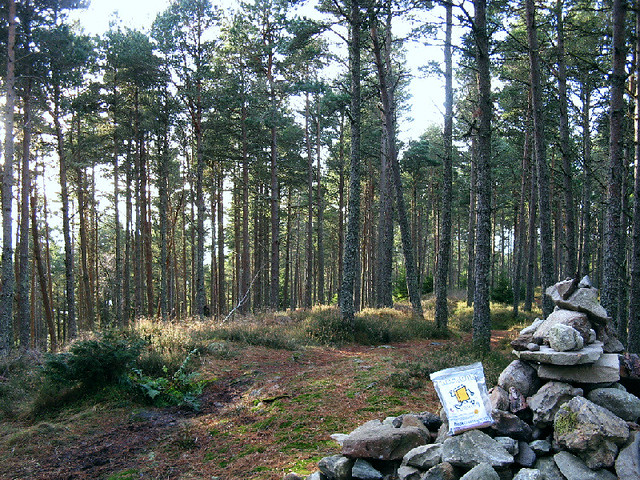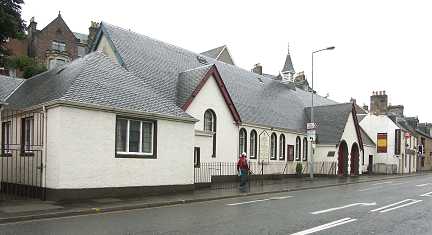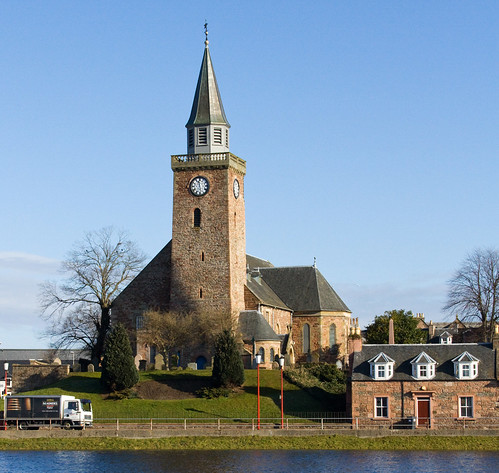The nearest church to my house is Westhill Free Church - indeed I can almost see it from my study window. Services are held at 11.00 am and 6.30 pm on Sundays. I often wondered what went on in the church during the week, because it always seems busy - and then I found out, it is a Seminary. Little did I know that there was a Major Seminary more or less on my own doorstep!

Here are details of the courses taught at the Seminary:
Greek & New Testament
Introduction
This course aims to give the student a knowledge of basic New Testament Greek language, using J.G. Machen's N.T. Grammar. Also a beginning to N.T. theology and exegesis is made. These latter are based on John 1:1-18.
New Testament 1
This course builds upon what was learned before, extending the knowledge of the language (chs. 14-22 in Gresham Machen), and focusing on Mark chapters 13-16 for exegesis. The textbook for New Testament theology is by Leon Morris.
New Testament 2
In this course attention is given to further development in the Greek language, (chapters 23-33 in Machen), and to exegesis (Romans chapters 3-11). Several points in Intermediate Greek (Department booklet) and also contemporary issues in New Testament theology are addressed in lectures. At the end of the course guidance is given regarding the use of New Testament Greek in the Ministry.
Students are set doctrinal and exegetical essays, and are encouraged to read widely. Lecture material refers to relevant books and articles. A study guide will be issued to all students on commencement of their first year and it will be expected that they will, as far as possible, adhere to the requirements of this schedule, which includes the submission of exercises to the lecturer for marking. Extra help with Greek grammar and language may be arranged with the lecturer should the student feel his need for this.
Examinations and Essays
Each student will be required to sit a mid-session examination in December and an end of session examination at the end of June. At least two essays will be set during each year on subjects related to the relevant year of the course.
Hebrew & Old Testament
Year 1 – Old Testament Introduction
This course of 65 lectures is divided into four modules; The Pentateuch, The Historical Books, The Poetic Books, The Prophetic Books. The books of the Old Testament are studied from four viewpoints; Historical Analysis, Literary Analysis, Thematic Analysis, New Testament Analysis.
Year 2 – Old Testament Language
This course is based on "Biblical Hebrew" by Kittel, Hoffer and Wright. The lectures are recorded onto CD using PowerPoint and Macromedia Flash multimedia software.
Year 3 – Old Testament Preaching
This course of 60 lectures begins with a number of lectures which consider the basic hermeneutical principles in preaching from the Old Testament. These principles are then applied in 50 exegetical lectures upon Old Testament passages. The main theme of these will be "Preaching Christ from the Old Testament".
Church History & Church Principles
First Session
Curriculum for Junior Class — Period c 30 AD to 1560 (Scottish Reformation). Approximately 30 Lectures will he given covering the following topics:
(a) Period c.30 AD to c.800 ( Early Church to Rise of Papacy). Apostolic/Post-Apostolic Period. Sources of Information. Apostolic Fathers & Apologists Writings (Irenaeus of Lyons, Hyppolytus, Tertullian, Cyprian, Origen). Early Heresies. Collation of the New Testament Canon. The Trinitarian Controversy. Person of Christ. Nicene Creed. Deity & Procession of the Holy Spirit. The Three Cappadocian Fathers. Council of Constantinople – The 'Filioque Clause'. Augustine of Hippo – Conflict with Pelagianism. Celibacy & Monastic Development. Christianity in Britain (Ninian). Emergence of Celtic Church (Patrick, Columba, Aiden). Conflict with Roman Church and Papal Claims. Synod of Whitby. Rise of Papacy. Gregory I – his achievements & writings. Papacy from Gregory I to Leo III (604-800). Conflict with secular rulers. Charlemagne crowned Holy Roman Emperor by Leo III (800). Reasons for rise of Papacy (political, religious, great forgeries – Apostolic Canons, Donation of Constantine, Decretals of Popes).
(b) Medieval Period (c.800 – c.1400). Doctrinal Controversies ( Monothelite, Adoptionist, Eucharistic, Images). Great Schism (Eastern Orthodox v. Western Catholic). Medieval Augustinians (Anselm, Bradwardine). Anselm's Theology (Doctrines of Existence of God, Sin, Freedom of the Will, The Atonement Cur Dens Homo. Bradwardine & his Apology for the Doctrines of Grace 'Of the Cause of God Against Pelagius'. Medieval Dissent and its Suppression. Papal Crusades. The Waldensians. Thomas Aquinas & Scholasticism. Aquinas’ Summa Theologica basic to Romanist Theology.
(c) Pre-Reformation and Reformation Period (c.1400 – 1560). Corruption of the Church. Attempts at Reform. Conciliarism (Councils of Pisa 1409, Constance 1414–18, Basle 1431–49) Reasons for failure. Mystic Pietism (de Groote, a Kempis). Attempts to reform doctrine & practice ( John Wycliffe & Lollardy. John Huss & Hussite Movement – theological significance). Early 16th Century Reformation Movement ( Erasmus & Greek N.T.; Luther, Melancthon, Zwingli etc.) John Calvin & Genevan Reformation. Reformation in England. The Scottish Reformation (Hamilton, Wishart, Knox). 1560 Triumph of Scottish Reformation (Scots Confession, First Book of Discipline, Act Abolishing Papal Supremacy).
Second Session
Curriculum for Senior Class — Period c.1560 – 2000.
Approximately 30 Lectures (including 7 on Church Principles) will be given covering the following topics:
(a) Post Reformation Period (1560-1600) including Knox's Liturgy and First & Second Books of Discipline– Andrew Melville and his reforms – Presbyterianism v Episcopacy – Black Acts 1584. Notable Revival (John Davidson of Prestonpans) – Counter Reformation in Scotland.
(b) Seventeenth Century. Synod of Dort & Arminianism 1618-19 & its influence upon Scotland. Scottish Conflict with Episcopacy – Welsh of Ayr – Bruce of St.Giles – David Dickson & the 1625 Stewarton Revival– John Livingston & the 1630 Kirk of Shotts Revival – 1638 National Covenant & 1643 Solemn League & Covenant – Westminster Assembly – Notable Participants – Rutherford, Gillespie etc. Church/State Relationships. Puritan Movement & its Influence. Covenanting Struggles. 1690 Revolution Settlement& Triumph of Presbyterianism.
(c) Eighteenth Century. Rise of Deism – Evangelical Opposition – Halliburton, Boston of Ettrick etc. – The Marrow Controversy – Intrusionism – 1733 Original Seccession – Ebenezer Erskine – Revivals – Moderatism
(d) Nineteenth Century – Evangelical Revival in Established Church – 1833 Veto Act – 10 Years' Conflict– 1843 Disruption. Free Church Principles: Headship of Christ – Spiritual Independence – Establishment Principle & Voluntaryism. Free Church Decline – Rise of Liberalism – Theological changes – Arminianism– Creedal Subscription – Doctrines of Scripture, the Atonement etc.– Purity of Worship – Church Union Controversies – Union of Secession Churches – 1892 Declaratory Act.
(e) Twentieth Century. 1900 Crisis & Union between F.C. majority and U.P. Church forming United Free Church. 1904 House of Lords Decision. 1905 Declaratory Act rescinded. 1929 Union of U.F. majority& Church of Scotland – Declaratory Articles of uniting church. Free Church division of 2000.
CHURCH PRINCIPLES LECTURES
These are covered over the two sessions of the Church History course.
(a) The Church
What it is and where it is to be found — The Head of the Church — The Marks of the Church — The Purpose of the Church — The Headship of Christ over Nations — Relationship between Church and State — The Antichrist
(b) Creeds and Confessions
General Considerations — Westminster Confession and Subscription
(c) Worship
Regulative Principle — Singing of Psalms (General) — Singing of Psalms (Scriptural basis) — Instrumental Music — Postures in Worship — Collections and Offerings — Prayer, Reading of Word and Benediction
(d) Sacraments
The Sacraments — Baptism (Mode and Meaning) — Baptism (Subjects) — Baptism (Responsibilities) — Lord's Supper (Institution and Benefits) — Lord's Supper (Partaking)
(e) Offices in the Church
The Office of Pastor — The Office of Ruling Elder (Calling) — The Office of Ruling Elder (Qualifications) — The Office of Ruling Elder (Responsibilities) — The Office of Ruling Elder (Respect concerning) — The Office of Deacon
(f) Church Government
Forms of Church Government
(g) Practice of the Free Church in her Several Courts
Introduction — Election of minister — Church meetings — Responsibilities of Courts — Presbytery — Synod and Assembly — Discipline
This is certainly a very rigorous training course! Let us pray for all the staff and students at the Seminary.
Lord God our Father
through our Saviour Jesus Christ
you have assured mankind of eternal life,
and in baptism have made us one with him:
Deliver us from the death of sin,
and raise us to new life in your love,
in the fellowship of the Holy Spirit,
by the grace of our Lord Jesus Christ. Amen.

































